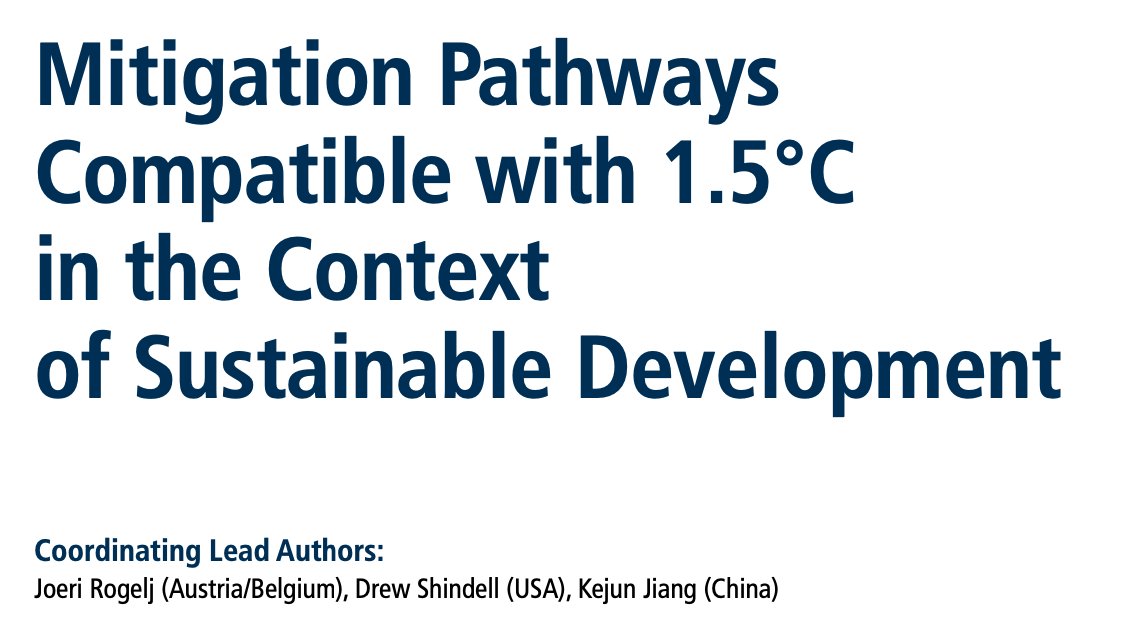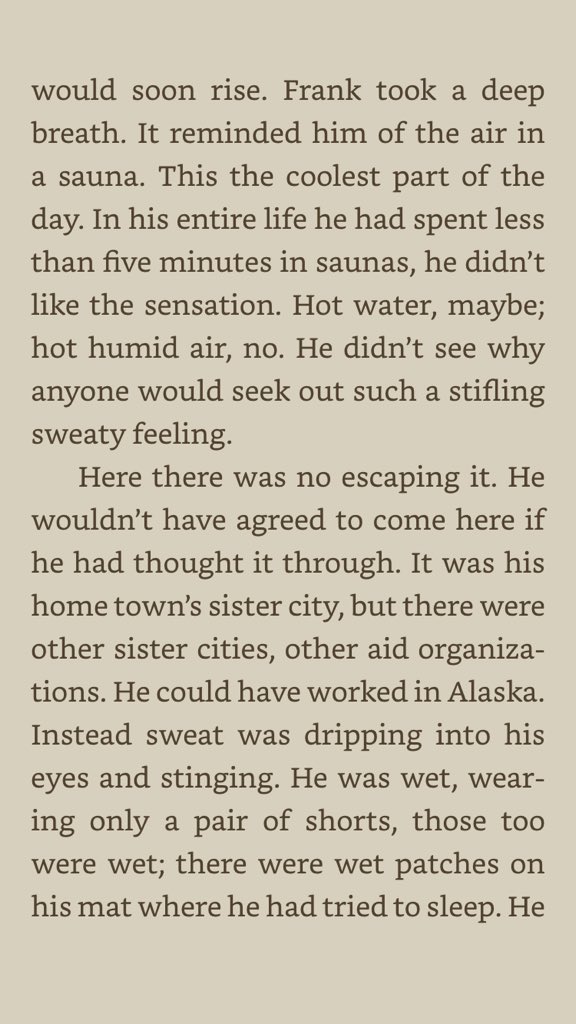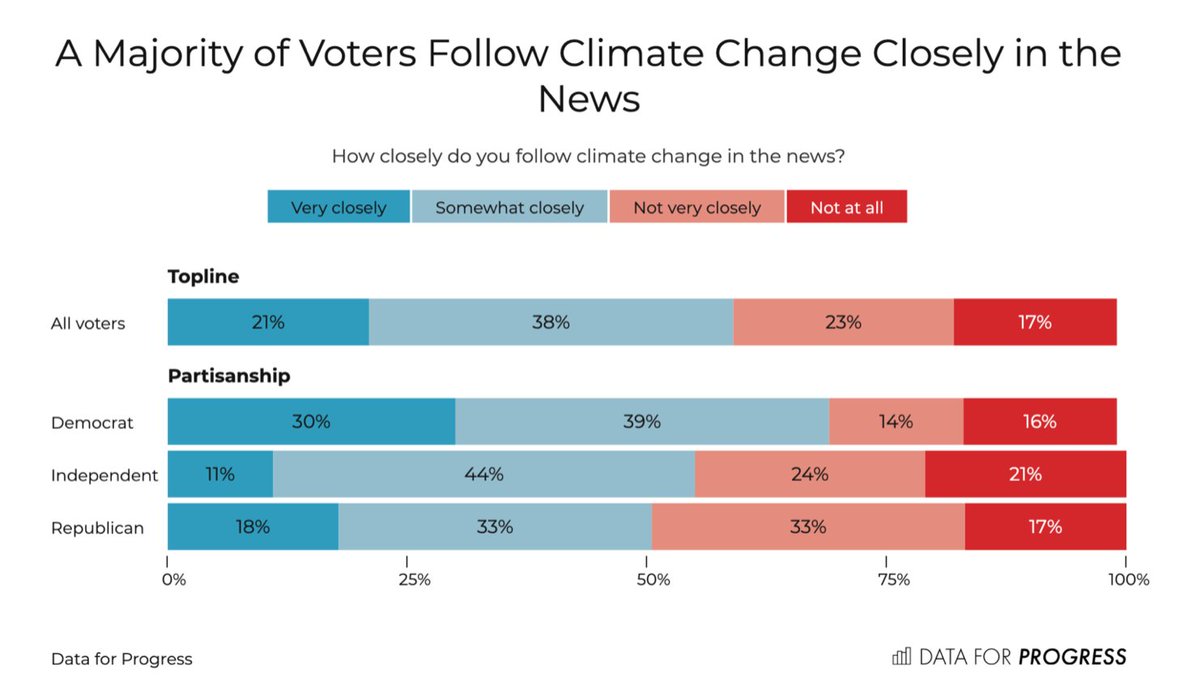
Carbon dioxide removal (CDR) is very much in the news right now, so I think it's time to review what the @IPCC_CH says about CDR in SR 1.5.
First: they say that CDR "deployed at scale" is speculative or "unproven"and relying on it to halt warming at 1.5C is a "major risk."👇
🧵
First: they say that CDR "deployed at scale" is speculative or "unproven"and relying on it to halt warming at 1.5C is a "major risk."👇
🧵
https://twitter.com/GretaThunberg/status/1350397304226897921

You'll often hear energy experts and the people who listen to them say that "we need CDR," as if this were a scientific fact about the carbon system or a level of emissions to which we are already locked in.
This is not true.
2/n
This is not true.
2/n
If we halted all GHG pollution within the next year or two, say, we would not need CDR to halt warming at 1.5C.
3/n
3/n
Saying we "need" CDR is an ideological judgement call about the political feasibility of deep decarbonization and our willingness to temporarily halt activities that cannot yet be decarbonized.
4/n
4/n
Political feasibility may well be as hard a constraint as physics, that's certainly possible, but let's at least be clear about what we're doing when we say we "need" CDR: turning politics into scientific destiny.
5/n
5/n
OK, back to the IPCC.
This is why SR 1.5 explains that the models use CDR "to neutralize emissions from sources for which no mitigation measures have been identified."
The models assume that those activities will continue despite global warming.
6/n
This is why SR 1.5 explains that the models use CDR "to neutralize emissions from sources for which no mitigation measures have been identified."
The models assume that those activities will continue despite global warming.
6/n
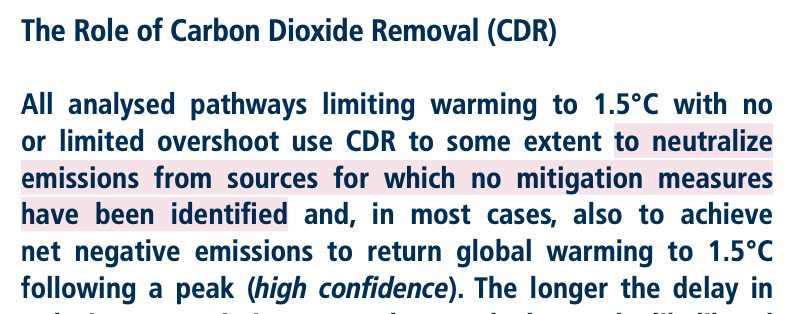
But let's look at the second part of that sentence, that the models include CDR "to achieve net negative emissions to return global warming to 1.5°C following a peak."
Why would the IAMs model decarbonization in this way?
7/n
Why would the IAMs model decarbonization in this way?
7/n
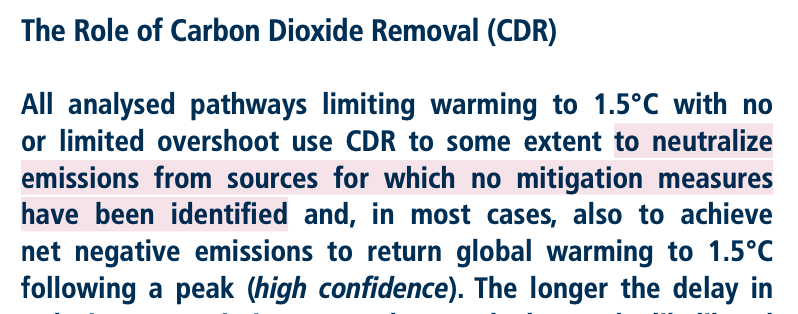
They model decarbonization in this way because their job is to model the most "cost-effective" pathways to a particular temperature target, not because there is some physical reason that we need CDR to save ourselves from climate breakdown.
8/n
8/n
Now, you could argue about the cost assumptions that go into these models, but here let's just concede that it will be better for the economy to keep emitting now and deploy "unproven" CDR at scale later.
The point is that CDR is about *the economy* & not about the planet.
9/n
The point is that CDR is about *the economy* & not about the planet.
9/n
Ok, let's just quote some more.
"The longer the delay in reducing CO2 emissions towards zero, the larger the likelihood of exceeding 1.5°C, and the heavier the implied reliance on net negative emissions after mid-century to return warming to 1.5°C (high confidence)."
10/n
"The longer the delay in reducing CO2 emissions towards zero, the larger the likelihood of exceeding 1.5°C, and the heavier the implied reliance on net negative emissions after mid-century to return warming to 1.5°C (high confidence)."
10/n

"The faster reduction of net CO2 emissions in 1.5°C compared to 2°C pathways is predominantly achieved by measures that result in less CO2 being produced and emitted."
11/n
11/n

Also important to note that even *if* we do manage to develop the tech to work at scale, people may not want huge machines sucking CO2 out of the air everywhere—& we may not be able to build the infrastructure (big again as the fossil fuel system itself) fast enough in any case👇 

And, finally, and probably most importantly, we don't even know if CDR is going to fucking work.
We don't know if we can overshoot 1.5C and then return to a lower temperature using CDR.
13/n
We don't know if we can overshoot 1.5C and then return to a lower temperature using CDR.
13/n

So, in short, any time you hear or read someone say that we "need" CDR (or discuss "net zero" without hearing them define "net" or acknowledge all these issues) your ideological spidey sense should start tingling.
14/n
14/n
• • •
Missing some Tweet in this thread? You can try to
force a refresh
